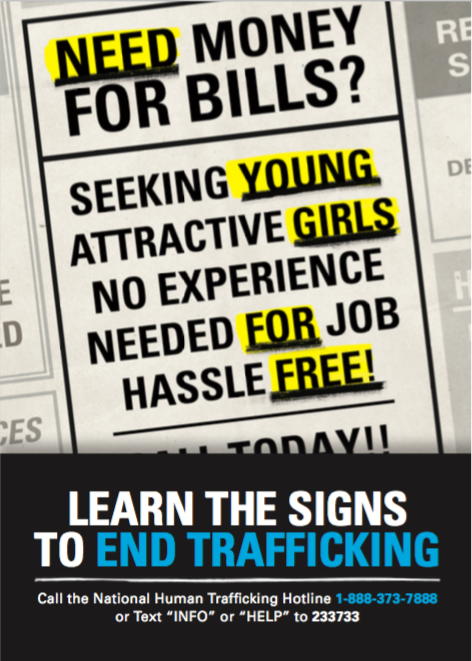Sophomores learn about human trafficking, modern-day slavery
ColLab speaker emphasized slavery as current issue, relevant in United States.
UNICEF (public domain)
A poster from the UNICEF End Human Trafficking Campaign illustrates how pimps often prey on young girls. Chandni Jain presented the issues of modern slavery to the Sophomore class during ColLab.
September 27, 2016
Sophomores gathered in Syufy Theater during ColLab for a presentation on human trafficking which included a speaker from the UNICEF End Human Trafficking campaign and excerpts from documentary film “Not My Life.”
“As we talk about historical conquests and slavery, especially in the United States, we want to make connections to modern forms of slavery,” history teacher Michael Stafford said. “Chandni [Jain] comes from UNICEF, and a really important idea she drives home is that this happens all over the world, including our own country.”
“Not My Life,” a film by Robert Bilheimer and Richard Young, details human trafficking and other forms of modern-day slavery across the world. Segments focus on the varied industries populated by child slaves, the effects of slavery around the globe and in the United States, and the reasons why human trafficking is such a flourishing trade.
Jain, a global citizenship fellow from the UNICEF End Human Trafficking campaign, also shared important data and statistics about human trafficking worldwide and initiated a class discussion about the issues presented.
“You never really realize that human trafficking is all around you, especially in a really privileged school and neighborhood,” sophomore Sofia Pirri said. “I didn’t know that it was so prominent in the United States, and that the girls and boys involved in it can be even younger than me.”
Jain told students about the incidences of human trafficking in San Francisco, but ended with how they could take action on the issues.
“That is the most critical part of presentations like these,” Stafford said. “Not only showing the pictures and telling the facts, but saying that something needs to be changed and we have the power to change it.”










